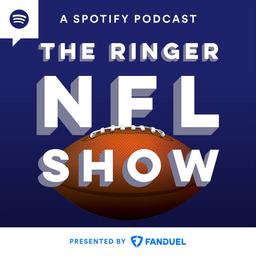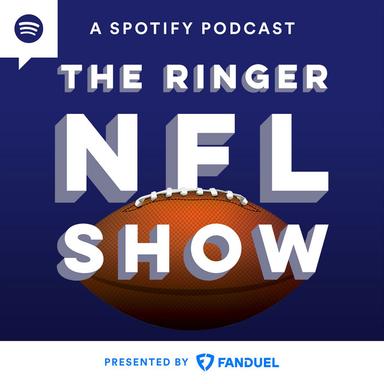The Curious Case of Aaron Rodgers is a special audio feature from Nora Princiotti on The Ringer NFL Show, exploring the last few years of the star quarterback’s life, as Rodgers’s legacy as one of the best passers in the NFL has become complicated by his public embrace of conspiracy theory culture. He’s now 40, in the final stages of his Hall of Fame career, on a team that has placed all of its Super Bowl aspirations on his shoulders. But because of his outspokenness on various controversial issues, notably vaccines, and his close relationship with former presidential candidate Robert F. Kennedy Jr., Rodgers could be dragging the NFL back into the culture wars during an election year—and once again revealing the ever-blurring line between athlete and public intellectual.
The following excerpt has been lightly edited for clarity.
Just a couple of years ago, Aaron Rodgers almost hosted Jeopardy! Now he’s spouting conspiracy theories. It’s a strange circumstance for the NFL and its fans, to try to square the Jets’ star savior quarterback with the antiestablishment ideologue.
After all, the NFL itself is a major American institution, one whose culture thrives on hierarchy and obedience, the very things Rodgers seems more and more bent on rejecting. And now, in the eleventh hour of his career, Rodgers’s legacy seems to hang in the balance of those competing values.
“This is the main story of our times. This is the individual versus the institution,” said Jon Ronson, a British documentarian who has spent decades studying conspiracy theory culture, whom I interviewed for this podcast.
As a team, the Jets have tied their Super Bowl hopes to Rodgers—and to their ability to give him what he wants. Which, perhaps above all else, is to be his own man. The Jets have given Rodgers input on decisions about coaching hires and personnel moves. It’s a level of influence that’s rare, even for a star player. Rodgers missed the team’s minicamp this spring because of a preplanned trip to Egypt. It caused a mini-controversy after head coach Robert Saleh described the absences as “unexcused,” but that has since blown over.
It’s a delicate balance, not because football teams aren’t used to having players with all sorts of belief systems, or because they don’t know how to handle some bad press. But most teams want their quarterbacks to model the behaviors they expect from everyone else. In a word: to lead. And handling Rodgers is a challenge, because the kind of falling into place the NFL typically rewards is exactly the thing he won’t do.
As far as the Jets seem to be concerned, if Rodgers wants to spend his off days this fall talking with podcasters and pundits, so be it. Their approach over the past few months has been to turn the other cheek and stick to football, even if he won’t. It’s an unprecedented situation not only because Rodgers is not your typical quarterback, but also because of the media ecosystem that gives him a platform, as Bryan Curtis, who covers media for The Ringer, explains.
“I think if you and I went back … through football history, we could find a lot of quarterbacks, or a lot of players at least, that had political views that weren’t that different than Aaron Rodgers, or were just, let’s say, outside the bounds of mainstream thinking in the same way that Aaron Rodgers’s opinions sometimes are,” Curtis said. “I don’t think we would find any that either were willing to share them like he is, or had the platforms to share them like he does. I think that’s part of really what makes him unique. He’s coming up in this age where he can not only hop on The Pat McAfee Show, but he can hop on any podcast and just go for an hour. … Roger Staubach couldn’t have done that, Joe Montana couldn’t have done that, even if they had wanted to.”
I asked Curtis to explain what he meant when he said “couldn’t have done that.” Was it because those views would have been considered too controversial 30 years ago, or because the media environment was less polarized than it is today?
“They would’ve been worried about what it would’ve done to their image or what it would’ve done to their locker rooms in a different way than Aaron Rodgers. But also where would they have done it? What hour of television in 1985 would’ve afforded them a forum to talk about politics, and vaccines, and other things? There just wasn’t a comparable platform for them,” Curtis said.
To me, all of this gets to the heart of why Rodgers is a hard figure to make sense of. How are we supposed to think of him? He is a citizen, with a right to his own opinions. Sure. But, he also has a major platform as a star athlete, which comes with certain expectations of using it wisely. And he’s also become a main character in a moment when sports and politics are mixing in a strange way. Our politics have become more and more welcoming to cultural figures who don’t have the usual credentials—and who don’t go through much real vetting. There’s genuine power to that. I mean, Aaron Rodgers was nearly a candidate for vice president!
Context matters. The closer he’s gotten to real politics, the more sharply his views have been analyzed. The CNN report claiming Rodgers had denied the Sandy Hook shooting, for instance, came just after Robert F. Kennedy Jr. revealed that Rodgers was on his VP short list. One of the reporters on that CNN story, Pamela Brown, said she had heard Rodgers make those claims herself in 2013. When Rodgers was just a quarterback, it wasn’t relevant news. Once it seemed like there was a chance he’d wind up on a presidential ticket, though, it was.
There’s definitely some logic to that. Elected officials have influence that NFL quarterbacks don’t. But the muddier the line gets between athlete and public intellectual, the harder that logic is to measure out. Does every one of Aaron Rodgers’s utterances this season need to be fact-checked like a statement from a candidate? If he voices a conspiracy theory from an NFL podium, who is expected to respond? The Jets? The league? Anyone?
“Like, these are all things that no one really needed to work out, at least on a daily basis, 20 years ago. And so in a way, he just—he happens to be the guy that we get to work all these things out about,” Curtis said.
I have a feeling a lot of us will have the opportunity to keep working through those things as this season continues. That said, as Rodgers approaches what’s probably his last best chance to finish an NFL season as a Super Bowl champ, I also bet he’s enough of a media buff to know this: If he and the Jets can make a real go of winning the Super Bowl this season, that story may at least temporarily drown out any others.
“I think winning games changes a lot of people’s minds. Winning games is a way to make people think of you as a football player full stop, and to have temporary amnesia about the rest of you,” Curtis said. “I think if Aaron Rodgers goes out and wins 12 games for the Jets, or God forbid, a Jets Super Bowl, I think there’ll be a lot of people that start thinking about him more as a quarterback than as a public intellectual. I just think that’s how it happens.”
Conventional wisdom in the football world says to shun distractions. But to Rodgers, they aren’t distractions at all. He is still trying to win the argument. Or maybe he’s still trying to win all the arguments. Vaccines. Censorship. How long it takes to recover from an Achilles injury. Basically anyone ever who’s told him what to do, or doubted what he could do.
What sets him apart from other controversial athletes is the zeal he seems to have for being part of the controversy. It’s not a sideshow. It’s his identity.
To hear the full episode of The Curious Case of Aaron Rodgers on The Ringer NFL Show, click here.
Host: Nora Princiotti
Story Editing: Lindsay Jones and Conor Nevins
Producers: Kaya McMullen and Vikram Patel
Sound Design: Kaya McMullen
Mixing and Mastering: Scott Somerville


